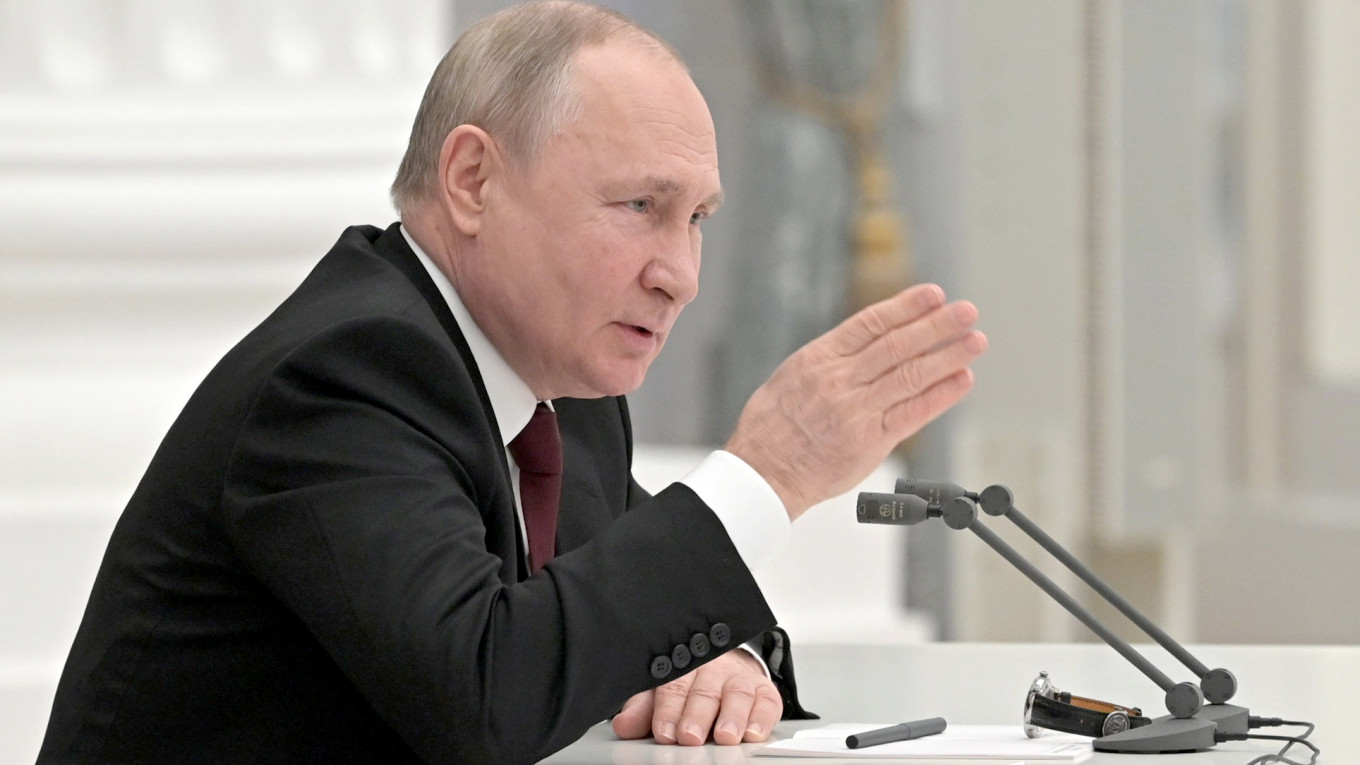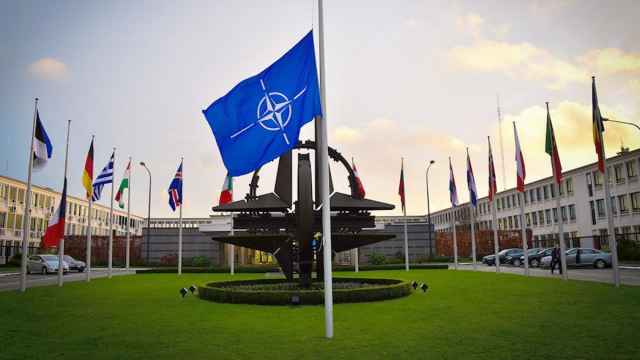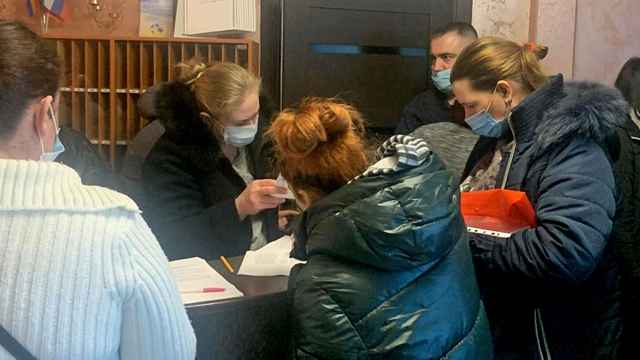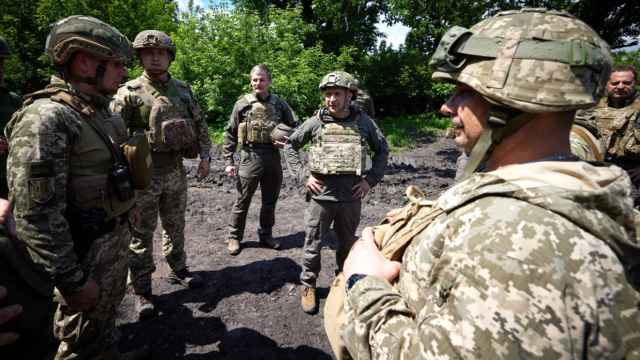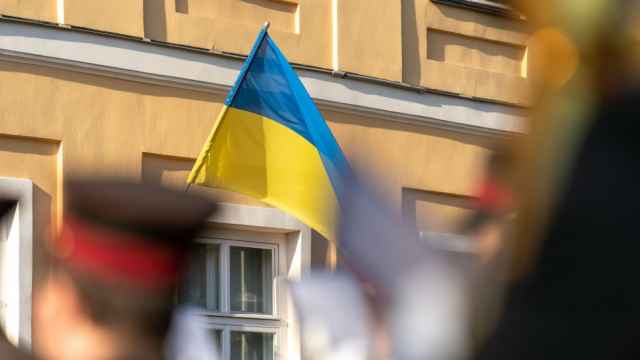Russian President Vladimir Putin said Monday he would decide by the end of the day whether to recognize two rebel regions of Ukraine as independent, a move that could set off a potentially catastrophic conflict with Kyiv's Western-backed government.
Presiding over a long and carefully stage-managed meeting of his powerful Security Council, Putin listened to senior officials say it was time for Russia to recognize the breakaway regions of Donetsk and Lugansk as independent.
"I have heard your opinions. The decision will be taken today," the Russian leader said after the meeting, which aired on state television for more than 90 minutes.
Such recognition would put an end to an already shaky peace plan in the separatist conflict, which has rumbled on since 2014 after Moscow annexed Crimea from Ukraine and has left more than 14,000 dead.
Russia could then move in troops to protect hundreds of thousands of residents in the regions who have been granted Russian passports, justifying an intervention as a defence of its citizens.
Ukraine would either have to accept the loss of a huge chunk of territory, or face an armed conflict with its vastly more powerful neighbour.
Putin told the security council there were "no prospects" for the 2015 Minsk peace accords aimed at resolving the conflict and made clear that the stakes were bigger than ex-Soviet Ukraine, whose efforts to join NATO and the European Union have deeply angered Moscow.
'Very big threat' to Russia
"The use of Ukraine as an instrument of confrontation with our country poses a serious, very big threat to us," Putin said.
The dramatic meeting — with Putin sitting alone at a desk as his government, military and security chiefs took turns addressing him from a podium — came after weeks of tensions between Moscow and the West over Ukraine.
Western leaders are warning that Russia is planning to invade its pro-Western neighbour after massing more than 150,000 troops on its borders, a claim Moscow has repeatedly denied.
Ukraine on Monday requested an urgent meeting of the UN Security Council to address the threat, citing security assurances it received in return for giving up its nuclear arsenal in 1994.
"On President [Volodymyr] Zelensky's initiative, I officially requested UNSC member states to immediately hold consultations under article six of the Budapest memorandum," Foreign Minister Dmytro Kuleba tweeted, citing the landmark 1994 deal, also signed by Russia, the United States and Britain.
The tensions have spiked in recent days after an outbreak of heavy shellfire on Ukraine's eastern frontline with the separatists and a series of reported incidents on the border with Russia.
In one of the most potentially dangerous, Moscow claimed — to furious Kyiv denials — that its forces had intercepted and killed five Ukrainian saboteurs who infiltrated Russian territory, and accused Ukraine of shelling a border post.
'Crush them, harm them'
Kyiv, concerned that Russia is building a narrative to justify an invasion, immediately denied all the allegations, which are being widely broadcast on Russian state media, and Foreign Minister Dmytro Kuleba took to Twitter.
"No, Ukraine did NOT: attack Donetsk or Lugansk, send saboteurs or APCs [armoured personnel carriers] over the Russian border, shell Russian territory, shell Russian border crossing, conduct acts of sabotage," he said.
"Ukraine also does NOT plan any such actions. Russia, stop your fake-producing factory now," he wrote.
European leaders are attempting to broker a diplomatic resolution, urging Putin to hold a summit with his U.S. counterpart Joe Biden, and Russian Foreign Minister Sergei Lavrov said he would meet his U.S. counterpart on Thursday in Geneva.
But any hope for diplomacy was faltering, especially in Washington and Kyiv.
U.S. National Security Advisor Jake Sullivan told NBC news that a Russian invasion of its neighbour would be an "extremely violent" operation followed by a brutal occupation.
"It will be a war waged by Russia on the Ukrainian people to repress them, to crush them, to harm them," the White House official said.
Visiting Brussels, Kuleba gave a cautious welcome to a French effort to arrange a summit of top leaders on the crisis.
"We believe that every effort aimed at a diplomatic solution is worth trying," he said.
But Defense Minister Oleksiy Reznikov said there was no sign of Russian forces withdrawing from the border and that Moscow-backed rebels continue to shell Ukrainian positions.
In recent weeks, according to U.S. intelligence, Moscow has massed an invasion force of troops, tanks, missile batteries and warships around Ukraine's borders in Belarus, Russia, Crimea and the Black Sea.
Biden has said that U.S. intelligence believes that Putin has made a decision to invade Ukraine and that commanders are readying units to attack within days.
Western powers have threatened a crippling sanctions package if Russia invades.
A Message from The Moscow Times:
Dear readers,
We are facing unprecedented challenges. Russia's Prosecutor General's Office has designated The Moscow Times as an "undesirable" organization, criminalizing our work and putting our staff at risk of prosecution. This follows our earlier unjust labeling as a "foreign agent."
These actions are direct attempts to silence independent journalism in Russia. The authorities claim our work "discredits the decisions of the Russian leadership." We see things differently: we strive to provide accurate, unbiased reporting on Russia.
We, the journalists of The Moscow Times, refuse to be silenced. But to continue our work, we need your help.
Your support, no matter how small, makes a world of difference. If you can, please support us monthly starting from just $2. It's quick to set up, and every contribution makes a significant impact.
By supporting The Moscow Times, you're defending open, independent journalism in the face of repression. Thank you for standing with us.
Remind me later.


